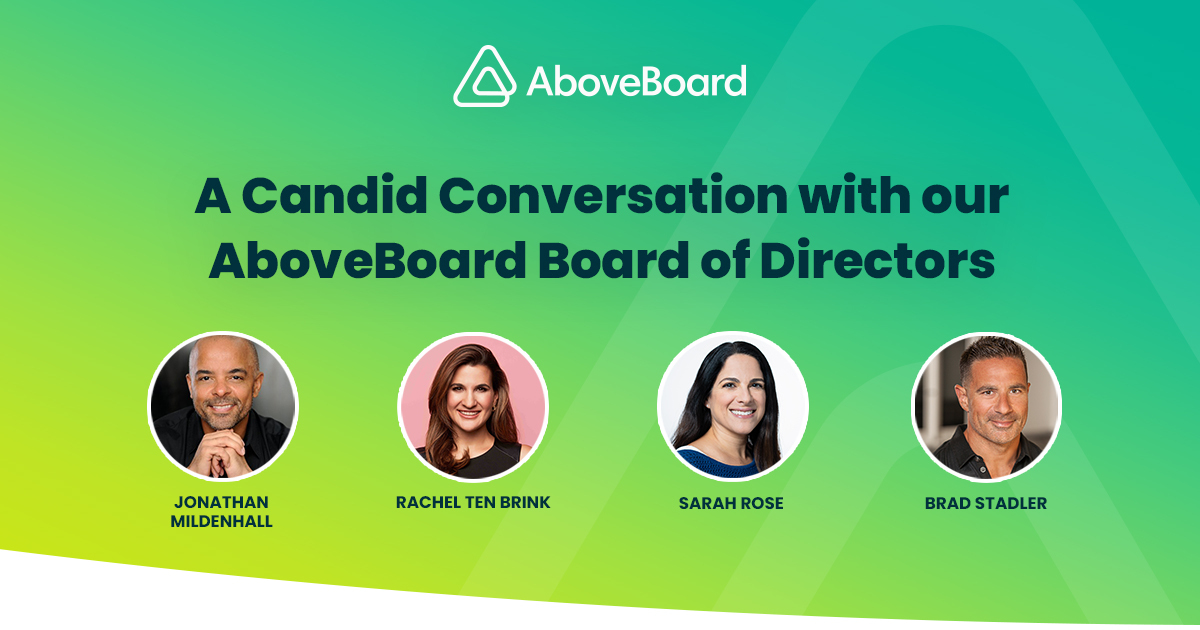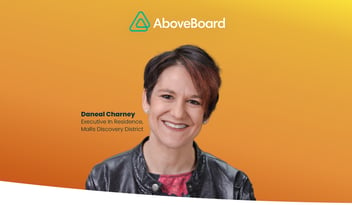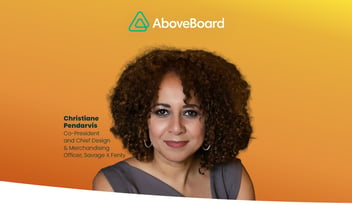Here's what we know: Representation matters.
When there is representation across demographics, gender, and identities, it helps a company both gain a competitive advantage and create long-lasting relationships with their employees, customers, and stakeholders.
And when representation exists throughout an organization—especially at the leadership level—the culture often promotes a deeper level of belonging and safety among underrepresented team members in the company. And when folks know they belong and have the safety to work in a creative environment, well then, productivity, growth, and revenue are sure to follow suit.
It’s with this idea that AboveBoard seeks to systematically change executive search and hiring to open a closed system to more people from underrepresented groups, including women, Latinx/Hispanic, and Black communities. And a big part of that change comes from our Board of Directors.
We reached out to each member of our Board of Directors—Jonathan Mildenhall, Rachel ten Brink, Sarah Rose, and Brad Stadler—to talk deeper about each of their journeys into executive roles. Below, they share why they’ve decided to help lead AboveBoard into creating a more diverse, inclusive, and equitable executive landscape.

As a Black executive, do you feel any additional pressures or weights when entering a new leadership role?
All my life (other than when I was competing in athletics tournaments at school) I have felt that I have had to work harder than my ‘majority’ counterparts, just to stay at parity. I had to put in the extra hours, ensure my work was the best it could possibly be, be the very best leader I am capable of being, in order to stay in the game.
There are times when I didn’t show up 110% and my goodness did I feel the repercussions. I found that as a Black executive in corporate and startup America there is little forgiveness, which to be honest I’m good with. The pressure has made me really, really good at what I do.
In what ways have traditional executive search and hiring processes inhibited the career potential of either yourself or other executives? As you continue to navigate your career journey, do you feel that adequate progress is being made to address this ongoing challenge?
I’m 54 years old and it is only now that I feel fully (on some days over) employed. For the last 15 years, board roles were not an option because I wasn’t in the old boys club. So I decided to make my own club. That led to board positions with AboveBoard, Everlane, and now GoFundMe.
"The old system doesn’t work for people like me. That’s why we need platforms like AboveBoard."
The old system doesn’t work for people like me. That’s why we need platforms like AboveBoard so we can level the playing field. I want all previously underemployed groups to get to the place of being fully employed.
When sharing the AboveBoard Board of Directors announcement, you said that serving on the AboveBoard board is "some of the most important work [you] do". In your opinion, what is the long-term impact of AboveBoard's mission and action?
The business case for diversity across all levels of employment is well told. But it goes beyond what’s good for business. DE&I in the workplace is the only way we will create a society that works in a more equitable way for us all. And that is the future I want to see for my children and all our children for that matter.

In your opinion, how is AboveBoard changing the game for executive search and hiring? Why have you chosen to serve on the AboveBoard Board of Directors?
AboveBoard is bringing something critical, especially for higher-level executive job-searches: transparency and the ability to control who you want to engage with and when.
For me as a Board member, the appeal of AboveBoard is two-fold. From a business perspective, I see a huge financial opportunity in creating a best-in-class, more transparent, and self-service marketplace for executive hiring. From a mission alignment, the platform empowers communities that have historically been excluded at the top echelons of executive roles, particularly women, Black, Latinx, and other minority candidates. I am a firm believer that you can do well by doing good.
When announcing your placement on our Board of Directors, you mentioned that you are "walking the talk" with this team of directors. In your opinion, what makes this group of minds so powerful?
Each of the members of the Board brings their own super-power to the table. Jonathan Mildenhall is truly a visionary and brings so much experience in developing brands with resonance. Sara Rose is one of the savviest marketplace operators I have ever met. I bring expertise in scaling companies from scratch and driving revenue. Most of all, what ties us together is a deep alignment with Lucinda’s mission to make diversity much more than a buzzword, it’s truly a competitive advantage. There is a real business case for diverse teams to drive better financial returns and higher innovation.
As a Latina executive, do you feel any additional pressures or weights when entering a new leadership role?
When I came to the US and started my career, I just put my head down and worked, ignoring what role being Latina would play. And while I still firmly believe in letting my work speak for itself and focusing on delivering results, I’ve learned over time that my Latina identity is actually a superpower.
"I've learned over time that my Latina identiy is actually a superpower."
I represent many constituencies: women, Latina, mom, entrepreneur, investor, marketer. And that means I can understand customers as well as employees through so many dimensions. I speak three languages, and that continues to open doors personally and in business. I am a proud product of Cuban immigrant parents: I know education, determination and big dreams are things that can never be taken away from you.
I'm also hyper-aware that there are so few of us in board and leadership roles, so my being a Latina brings additional visibility. It means the responsibility to deliver: as often the only Latina on a board, how I perform can be perceived as a broader representation. On the other hand, I know the next generation of leaders are watching and this is a huge honor. I don’t want to be the lone representative, I want to bring others along.

Diversity in leadership is much more than demographic percentages and numbers. At AboveBoard, we often say that we're driving change from the top. In your opinion, what does "driving change from the top" mean to you?
Many companies have been able to move the needle, at least a little, on diversity in entry-level and non-management roles. However, board and executive leaders are the ones who set strategic priorities and establish the culture of an organization. For real, impactful change to occur, I believe that companies must have diverse representation at every level, especially at the top.
When sharing the AboveBoard Board of Directors announcement, you shared that AboveBoard "simply needs to exist." In your opinion, what makes both the concept and reality of AboveBoard's existence so impactful?
When I first set out to join a board, every single recruiter, board member, and colleague I spoke to said that getting the first Board Director role would be incredibly hard. They explained that companies want someone with prior board experience, so you need to find someone who is willing to take a risk on you. The vast majority of the time it will be your existing connections and colleagues who are willing to take that risk. But when the system is already stacked with a lack of diverse leadership, then people from diverse backgrounds are less likely to have a “friend” in that position.
"Finally, there is a place where diverse candidates have visibility and access to the highest level opportunities, and companies have a platform to help them truly bring diversity to leadership."
Furthermore, many companies never even post board roles, but rather look solely in their existing networks. Thus, diverse candidates with few friends at the top never even know the opportunity exists, much less have the chance to apply. It’s a reinforcing negative cycle. AboveBoard solves that problem. Finally, there is a place where diverse candidates have visibility and access to the highest level opportunities, and companies have a platform to help them truly bring diversity to leadership. For this reason, AboveBoard simply needs to exist.
How has the traditional lack of diversity in leadership impacted your approach to new leadership roles?
Starting a new leadership role is always a fun challenge. One of the first and most important things a leader has to do is to build trust with the team. We know that people often have an easier time building trust with people from similar backgrounds. It is a leader’s imperative to transcend that and build trust with all members - they must create a culture of psychological safety and belonging.
In my experience, by having diversity in leadership, diverse employees are more likely to feel a sense of belonging and psychological safety. With this trust firmly in place, leaders are able to foster deeper engagement amongst the team and ultimately greater impact.

What were some of the driving or foundational intentions when co-founding AboveBoard through True?
We always believed that a marketplace model could and will be applied to part of the executive search market. This is a concept we have been thinking through since we founded True. In the last several years, it became obvious to us that we, and the executive search industry, struggled with delivering fully inclusive candidate pools to their clients. We then had the idea that providing transparency to opportunities within a marketplace model might attract a more diverse candidate pool.
What are some of the biggest challenges you see in recruiting regarding composing and retaining a diverse and inclusive leadership team? What are some solutions you see developing to address this ongoing challenge?
Often, diversity is a strong mandate early in the recruiting process, but instead, many companies gravitate to the executive profiles they’ve always chosen or to the “been there, done that” experience. Unfortunately, these habits usually exclude underrepresented candidates that haven’t previously been given the chance to be there and do that. There also can be a bias around “culture fit” where hiring teams assess a candidate based on their ability to assimilate to what’s already there, instead of focusing on a candidate's ability to add fresh perspective through their own unique lens.
"The solution is to take a holistic view of your approach to talent—from where you’re sourcing candidates, to rethinking hiring criteria."
When it comes to retention, the companies we’ve seen do well take an honest look at themselves. They’ll ask :
- “Is our culture welcoming and inclusive?”
- “Does our performance management process keep everyone accountable?”
- “How are we tracking success and how quickly do we pivot where necessary?”
It’s critical that you find these answers and build an infrastructure that not only helps the entire business benefit from a diverse environment, but that also provides underrepresented leaders with a quality employee experience.
The solution is to take a holistic view of your approach to talent—from where you’re sourcing candidates, to rethinking hiring criteria, to running an unbiased interview process, and even thinking inclusively about succession planning. Also, the company should know that diversity is not optional. Include diversity goals in conversations about strategy, business goals, hiring plans, conversations about progress, etc.
Transparency of opportunities is important as well, which is where AboveBoard really shines. You have to create opportunities for candidates who have the competencies, skill sets, leadership qualities, and potential to perform in the role and empower them to do it once they’re in the seat.
Do you have any advice for individuals new to the executive space or those looking to expand their careers on how to approach their leadership roles?
First, you have to embrace the unknown. Some of the best leaders we’ve seen are comfortable with ambiguity and they’re not afraid of what they don’t know.
"Transparency of opportunities is important as well, which is where AboveBoard really shines."
I also think it’s important for new executives to build high-performing teams they can trust. You can’t do it alone and if you’re able to communicate effectively and inspire action, you’ll find that your ability to influence will grow quickly.
Finally, I’d say you have to be laser-focused on the right priorities. Minimize distractions, fiercely guard your time, and you will see the results you’re looking for.









